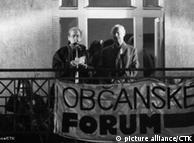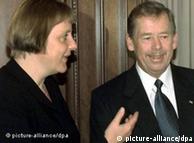Dissident playwright who led velvet revolution and became first post-communist Czechoslovakian president dies.

Guardian.co.uk, Sunday 18 December 2011 11.37 GMT
Article history
Václav Havel, the dissident playwright who led the Czechoslovakian "velvet revolution" and was one of the fathers of the east European pro-democracy movement that led to the fall of the Berlin wall, has died aged 75.
Reports quoted his assistant, Sabina Tančevová, as saying Havel died at his weekend house on Sunday morning, and the news was announced on Czech television during an interview with the current prime minister, Petr Necas.
Necas called Havel "the symbol of 1989" and said he did "a tremendous job for this country".
Havel's state funeral is likely to draw a crowd of leaders, artists and intellectuals from around the world. Havel was a renowned playwright and essayist who, after the crushing of the Prague spring in 1968, was drawn increasingly into the political struggle against the Czechoslovakian communist dictatorship, which he called Absurdistan. His involvement in the Charter 77 movement for freedom of speech won him admiration around the world.
His commitment to non-violent resistance helped ensure the velvet revolution was bloodless. It also help ensured that the "velvet divorce" three years later, when the country split into the Czech Republic and Slovakia, was equally peaceful.
Havel opposed the split and stepped down from his position as president in 1992, rather than oversee the process. However, he stood for the presidency of the Czech Republic early the following year and won. It was a non-executive position but Havel brought to it both moral authority and prestige on the world stage. He stayed in the position, despite bouts of ill health including lung cancer, until 2003.
His role in the east European revolutions of 1989 was second only to Lech Walesa's in Poland. As the twin inspirations of the pro-democracy movement, they were strikingly contrasting figures: Walesa a flamboyant, brash, working-class union agitator; Havel a soft-spoken intellectual from a well-to-do family, who was a reluctant politician.
He was one of a generation who came to political consciousness in the 1960s. Rock stars such as Frank Zappa were among his heroes and late in life he continued to sign his name with a small heart-shaped flourish.
His motto was: "Truth and love must prevail over lies and hate."
World leaders have paid tribute to Havel. British Prime Minister David Cameron said: "Havel devoted his life to the cause of human freedom. For years, communism tried to crush him, and to extinguish his voice. But Havel, the playwright and the dissident, could not be silenced.
"No one of my generation will ever forget those powerful scenes from Wenceslas Square two decades ago. Havel led the Czech people out of tyranny. And he helped bring freedom and democracy to our entire continent.
"Europe owes Vaclav Havel a profound debt. Today his voice has fallen silent. But his example and the cause to which he devoted his life will live on."
German Chancellor Angela Merkel, who grew up in East Germany and went into politics as communism crumbled, said she learned "with great dismay" of Havel's death.
"His dedication to freedom and democracy is as unforgotten as his great humanity," Merkel wrote in a message to Klaus. "We Germans also have much to thank him for. Together with you, we mourn the loss of a great European."
The president of the European parliament Jerzy Buzek, a former Polish prime minister and activist in Solidarity, wrote on Twitter: "Vaclav Havel is the figure that represents the Velvet Revolution and the reunification of Europe. He will be sorely missed."
Vaclav Klaus, Havel's political arch-rival who replaced him as president in 2003, called Havel "the symbol of the new era of the Czech state".
Foreign minister Karel Schwarzenberg added that Havel "returned dignity to the Czech nation."
In neighbouring Poland, the founder of the anti-communist Solidarity movement and former president Lech Walesa called Havel "a great fighter for the freedom of nations and for democracy".
"It is a great pity and a great loss. His outstanding voice of wisdom will be missed in Europe," said Walesa, the 1983 Nobel Peace Prize laureate.
http://www.guardian.co.uk/world/2011/dec/18/vaclav-havel-dies
Former Czech president and anti-communist hero Vaclav Havel dies
Vaclav Havel, Czech dissident playwright who became his country's first democratically elected president, has died. Havel oversaw his country's transition to democracy and the peaceful breakup of Czechoslovakia.
Former Czech President Vaclav Havel died on Sunday morning at his weekend house in the northern Czech Republic, according to his assistant Sabina Dancecova. The 75-year-old had long battled poor health, partly caused by the time he spent in communist jails and years of chain smoking.
The dissident playwright wove theater into politics and became a hero in the movement that toppled the 41-year communist rule of Czechoslovakia in late 1989 before becoming the country's first post-communist president.
Havel was born in Prague in 1936 to a family that owned film studios and prime real estate in the city. After the communists took control after World War II, Havel was labeled a bourgeois capitalist and banned from studying. Despite this setback, he would work his way up in the theater world to become a writer and director.

Havel (left) came to personify the revolution against the communist government in Czechoslovakia
When the regime cracked down on the Prague Spring in 1968 he was also banned from the theater but continued writing and became more involved in the dissident movement. His political activism began in earnest in January 1977 when he helped draw up Charter 77, a manifesto calling on the communist authorities to live up to the international commitments they had made on human rights.
When the wave of revolutions sweeping across central and eastern Europe in 1989 reached Czechoslovakia, Havel was, as he put it, "catapulted" into the presidency overnight, just months after being released from jail. On December 29, 1989 he was elected Czechoslovakia's president by the country's still-communist parliament.
As president of Czechoslovia and then, after the country's peaceful division into the Czech Republic and Slovakia in 1993, as president of the Czech Republic, Havel would guide the country through democratic and economic transition. He presided over the Czech Republic's entry into NATO in 1999 and was largely credited with laying the groundwork for the country's accession into the European Union in 2004.
'Symbol of 1989'
Czech Prime Minister Petr Nacas called him a "symbol of 1989" and said Havel did a "great job for this country."
In Poland, former president and founder of the Solidarity movement Lech Walesa called Havel "a great fighter for the freeddom of nations and for democracy."
German Foreign Minister Guido Westerwelle honored him as "a great champion for democracy and freedom," and "the soul of the Czech revolution."
 Merkel mourns the "loss of a great European"
Merkel mourns the "loss of a great European"
"Without him and his courageous words, the democratic awakening in Central and Eastern Europe would have been unthinkable," Westerwelle said.
German Chancellor Angela Merkel called him "a great European," adding that "we Germans in particular have much to thank him for."
Former chancellor Helmut Kohl, who was in office during the political changes in 1989 and 1990, said Havel was "a great man without whom freedom would have been unthinkable."
A busy retirement
After serving the maximum two consecutive terms in office, Havel left the presidency in 2003. He devoted his time to fighting for human rights internationally, supporting Cuban and Chinese dissidents, the democratic opposition in Belarus, the fight against the military junta in Myanmar and Vladimir Putin's tenacious grip on power in Russia.
"The post-presidential life resembles the life of a president," he said, "But it's harder because you can be president for several years, but you are an ex-president until you die. Which brings numerous obligations."
Havel also continued to work in the arts. He published a new play, "Leaving," about the struggles of a leader on his way out of office in 2008 and also directed the film version, which debuted earlier this year.
Author: Holly Fox (AFP, AP, Reuters)
Editor: Nicole Goebel
http://www.dw-world.de/dw/article/0,,15610756,00.html
【聯合報╱記者王麗娟/即時報導】
2011.12.18 09:30 pm
以劇作家、文學家身分於捷克帶動「絲絨革命」、推翻共產專政的捷克前總統哈維,18日在他於捷克北部的周末度假屋中辭世,享年75。
哈維同時是捷克第一位民選總統,率領捷克變遷成為民主、自由市場的經濟體。1970年代,哈維因參與捷克人權宣言「77憲章」的發起,成為國際知名的異議劇作家。
哈維去世時,妻子妲歌瑪渋薇絲柯諾娃隨侍在側。哈維菸癮很大,1970年代因反共入獄時,即有呼吸道問題。2009年1月12日哈維因發炎住院,動過咽喉手術後,一直有呼吸困難毛病。(綜合報導)


